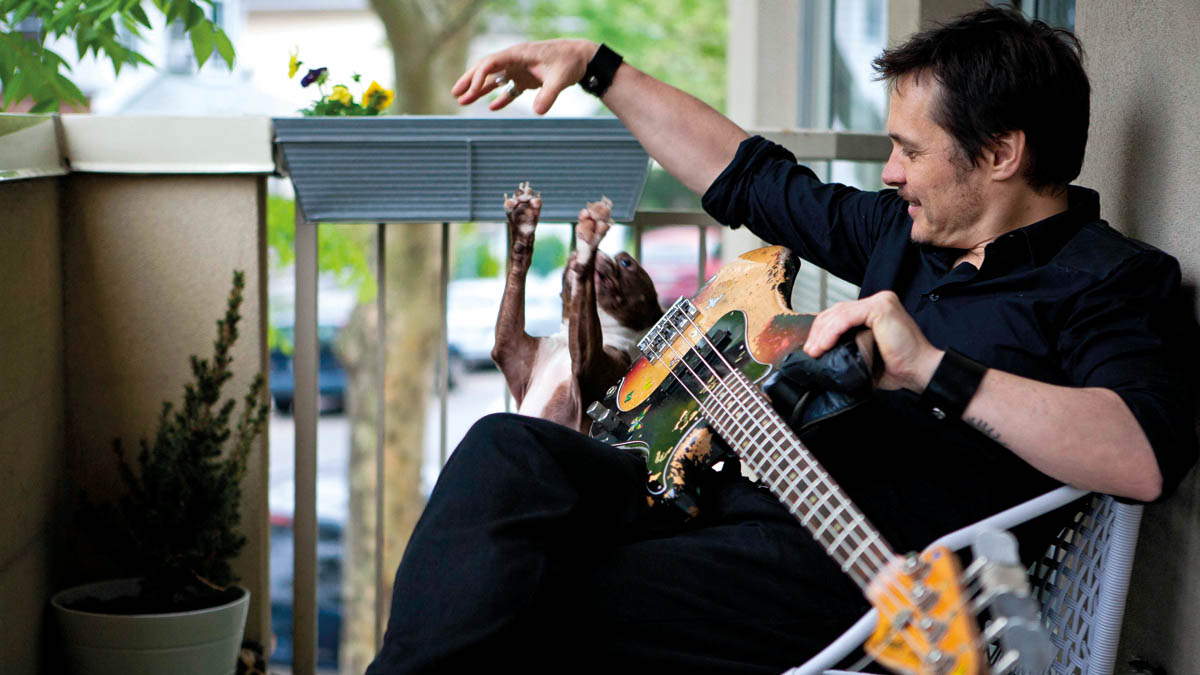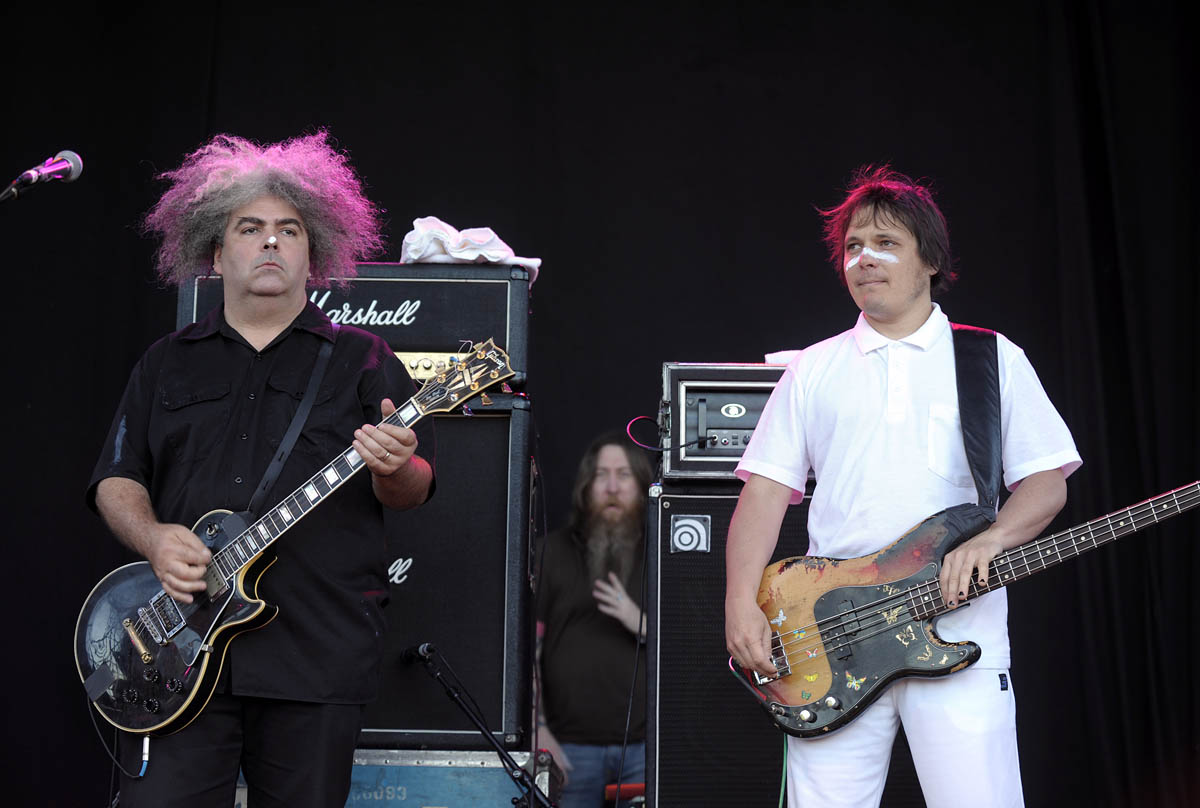Trevor Dunn: “It’s in my personality to sit back and groove with the drummer – I took to bass immediately“
With his groundbreaking work with Mr. Bungle, John Zorn and Tomahawk, Dunn is a bassist like no other

Mr. Bungle, the California-based five-piece, were formed in 1985, and have always inhabited slightly vague musical territory in their sporadic periods of activity since then.
Their singer Mike Patton is better known for his work with Faith No More, who tip a hat to the more eclectic work of Bungle from time to time, but who generally remain much more digestible in their approach.
In 2021, however, Mr Bungle are arguably enjoying a higher profile than FNM for the first time, thanks to an astounding album they recently released on Patton’s label, Ipecac.
The album, The Raging Wrath Of The Easter Bunny Demo, is a modern reworking of the 1986 demo of the same name. Back then it was a cassette of attempts to play thrash metal; the just-released version is an all-grown-up transformation of the old songs into an unexpectedly savage suite of music.
I had a couple of really great teachers. I remember one of them would show me blues basslines and play guitar over the top of them, which was amazing training
To achieve this, the core Bungle members Patton, Trey Spruance (guitar), and Trevor Dunn (bass) invited two veteran thrash metallers onboard – Scott Ian, Anthrax guitarist, and Dave Lombardo, formerly of Slayer, now of Suicidal Tendencies.
Recorded at Dave Grohl’s Studio 606 in Los Angeles, the record is completely unpredictable, even by the standards of this bizarre band. We asked Dunn to talk us through it from a bass guitar point of view...
Here you are, Trevor, with the metal album of 2020, even though you’re not a metal band. What’s it like playing bass alongside Scott Ian and Dave Lombardo?
Get The Pick Newsletter
All the latest guitar news, interviews, lessons, reviews, deals and more, direct to your inbox!
“Both those guys are relentless, it’s great. Me and Mike and Trey were joking about it, like ‘These old men are keeping us on our toes!’ There’s a lot of distorted bass on there. I used a really cool pedal called a Gamechanger Audio Plasma for some of that.
“Patton gave it to me for my birthday, which was our first day of rehearsal. That was just at a couple of points on the album; mostly I used a Line 6 modeler, because I like being able to have different distortions. I like to have only a little bit of distortion so the bottom end can do its thing.
“I’m super-happy with the tones on the album, and I also attribute that to the amp I used. I was going to use an Ampeg SVT, but it was basically too loud for this room we recorded in, so I used a Verellen Meatsmoke amp. I’d never used one before, but I gave it a try, and it was amazing. I also want to give our mixing engineer Jay Ruston a nod, because he’s a bass player.
“We had to mix remotely, with him sending us mixes and us all chiming in from different parts of the country, and as soon as I heard it, I thought the bass sounded killer. Usually the bass is buried in the guitars in metal.“
So why did you decide to re-record the old demo songs?
“It was initially just a fun idea for me and Trey and Mike. Our first demo from 1986 never left our side, in a way – we only played music from it a couple of times, and of course no-one knew what it was: we could have been playing any weird cover. But we wrote that music with people like Dave and Scott in mind, and we thought, ‘Man, it would be fun to revisit this,’ and it really was super-fun, especially with those guys, who were kicking our asses.“
Did you record it before the pandemic?
“We played some shows in the first week of February 2020, and we went into the studio right after that, in mid-February. A couple of us got sick right around that time – Dave and Trey had a really weird flu thing that they’d never had before – so it’s very possible that a couple of us had the coronavirus all the way back then.“
How did you become a bass player?
“My first instrument when I was a kid was the clarinet, but my older brother played guitar, and he started bringing home rock records by bands like Kiss and Blondie and Ted Nugent and Elton John.
“He would crank them up and play along with them really loudly until the neighbors complained, and I decided I wanted to play bass, although I don’t think I really knew the difference between guitar and bass back then.
“My dad tried to talk me out of it, saying, ‘Why don’t you play guitar? It’s more up front,’ but decades later I now know that I’m definitely a bass player rather than a guitar player. It’s in my personality to sit back and groove with the drummer, and I took to it immediately. My first bass was a dark brown Hondo of some kind. I played it on our first demo, but I sold it when I was in college, and bought an Ibanez.“

Did you take lessons?
“Yes, I had a couple of really great teachers. I remember one of them would show me blues basslines and play guitar over the top of them, which was amazing training. They turned me onto the greats like Stanley Clarke and Jaco and Louis Johnson and Bobby Vega.
I’m using a 1975 Fender P-Bass that I bought in the '90s for $700 or something – it’s probably worth more now. That’s my go-to bass with this version of our band
“One of them made me a tape of songs with amazing basslines, and I didn’t even know what they were until I got older. I’d hear a song by Sly Stone, and realize that I knew the song even before I knew who the band was.“
What’s your bass setup nowadays?
“I’m using a 1975 Fender P-Bass that I bought in the '90s for $700 or something – it’s probably worth more now. That’s my go-to bass with this version of our band. I use D’Addario strings in Bungle, and La Bella flats in other bands.
“I usually let them go dead, but for metal I like the tones a little more crispy. I also have a five-string Alembic that I’ve had for years and I really love. That’s also a great bass for metal, and I was considering using it for this record, but it’s really heavy and not so good for travel.“
Are you usually an Ampeg user?
“Yes, I ask for an 8x10 cab and an Ampeg Pro 4 SVT when we’re touring, but I also like the old tube amps, although they’re so frickin’ heavy. If the tubes are good in those amps, you almost don’t need any pedals, the grit is so good. I use some distortion in this version of Bungle, but not much, because the guitars cover it and I don’t want to oversaturate the bass.“
What else do you do apart from Mr Bungle?
“I play a lot with John Zorn in a bunch of his ensembles here in New York, and I also play upright in a couple of different jazz-leaning bands, although I’m not a traditional jazz bassist.“
What’s it like playing with Zorn?
“He’s intense and hard-working; kind of what you would expect from hearing his music. I’ve been working with him for 20 years, and I’ve definitely learned a lot from playing with him.“
Is he a tough boss?
“He definitely likes to push his musicians. He hires people that he trusts, and then he pushes your abilities. If I can get through a recording with him, the next one’s going to be even more difficult, like, ‘Oh, you can do that? Well, maybe you can do this!’ Ha a! It’s always really fun, though. He takes his music very seriously, although some people seem to think that he means it as a joke.“
Your band suffers from the same thing, presumably?
“Yes, and this new record is not helping that at all! I’ve read some comments here and there along the lines of ‘This isn’t the real Bungle’ but man, we put a lot of energy into this album. It’s kind of what we started out as, when we were 15 or 16 years old – all the metal guys were our heroes. We could have become that, I guess, but then we started listening to bands like Fishbone and everything changed for us...“
- The Raging Wrath Of The Easter Bunny Demo is out now on Ipecac Recordings.
Joel McIver was the Editor of Bass Player magazine from 2018 to 2022, having spent six years before that editing Bass Guitar magazine. A journalist with 25 years' experience in the music field, he's also the author of 35 books, a couple of bestsellers among them. He regularly appears on podcasts, radio and TV.
“When I first heard his voice in my headphones, there was that moment of, ‘My God! I’m recording with David Bowie!’” Bassist Tim Lefebvre on the making of David Bowie's Lazarus
“One of the guys said, ‘Joni, there’s this weird bass player in Florida, you’d probably like him’”: How Joni Mitchell formed an unlikely partnership with Jaco Pastorius










